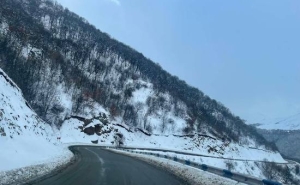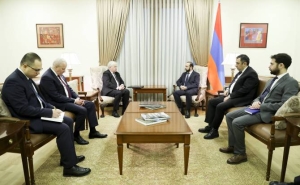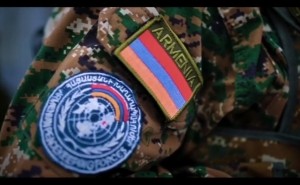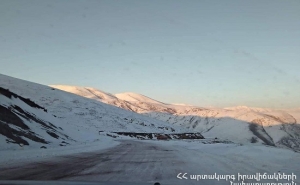 As a Result of Not Carrying Out the Demands of the UN SC Resolutions By Azerbaijan Ceasefire Agreement Was Suggested
As a Result of Not Carrying Out the Demands of the UN SC Resolutions By Azerbaijan Ceasefire Agreement Was Suggested

On May 12, 1994
Moreover, on April 2016
It is noteworthy that in the presence of 1994-95 ceasefire agreements Azerbaijani side does not fulfill its commitments, moreover, as if forgetting about their existence it continues referring to the 4 resolutions of the UN Security Council, putting the emphasis only on one point – withdrawal of Armenian forces. In this context it is important to pay attention to several factors.
First, besides the point in the UN SC resolutions voiced by
Second, doesn't
It is noteworthy that after the April war
It is obvious that the policy carried out by the Azerbaijani authorities and the existing situation in the context of Karabakh conflict do not correspond to the commitments of Azerbaijan fixed in the 1994-95 agreements. It is conditioned by this fact that the OSCE Minsk Group Co-Chairs, despite the absence of addressed calls, periodically call on to observe the ceasefire regime. It is also obvious that at least the mediators of these agreements cannot be indifferent towards the violations of the ceasefire regime and should adopt tougher stance towards
This refers also to the agreements reached during the
In the created situation, maybe, besides carrying out the above mentioned agreements reached, it would be logical to sign an agreement among
Other materials on this subject
- Russian forces have clearly failed in their duties: senators press Biden Administration to break Azerbaijan’s blockade The United States cannot stand aside while the Aliyev regime callously threatens the lives of Nagorno-Karabakh’s citizens, and must hold Azerbaijan to account for blocking a civilian population’s access...
- US calls for the full restoration of free movement through the Lachin Corridor "We remain concerned about impeded access to the Lachin Corridor and the humanitarian implications of this situation. This sets back the peace process and undermines international confidence. We call for...
- Azerbaijani forces violate the ceasefire in Artsakh The ceasefire violation was reported to the command of the Russian peacekeeping troops.
- Azerbaijani units violate ceasefire in several directions, Artsakh’s Defense Ministry says The Armenian side has no losses. The incidents of ceasefire violations were reported to the command of the Russian peacekeeping troops.
- Russian Diplomat Reassures Armenians Over Corridor In Karabakh "The parties are in direct contact, and I assure you that the peacekeepers will not move a single centimeter until there is a new corridor," Seleznyov said.
-
 17:08
17:08The regular session of the Anti-corruption Policy Council takes place in Jermuk
-
 15:05
15:05The Prime Minister sends congratulatory messages to the supreme leader of Iran and the President of Iran
-
 11:11
11:11Armenia sends earthquake aid to Turkey
-
 10:43
10:43Commemoration of the Pontiff St. Sahak Partev
-
 09:16
09:16Some roads are closed and difficult to pass in Armenia
-
 19:55
19:55Phone conversation of the Foreign Minister of Armenia with the U.S. Assistant Secretary of State for European and Eurasian Affairs
-
 18:30
18:30Prime Minister Pashinyan and President Khachaturyan meet
-
 18:20
18:20Ararat Mirzoyan with Co-Chairman of the OSCE Minsk Group of France Brice Roquefeuil
-
 17:01
17:01Humans could land on Mars within 10 years, Musk predicts
-
 16:45
16:45France, US urge 'immediate' end to Nagorno Karabakh blockade
-
 16:01
16:01Blockaded Nagorno Karabakh launches fundraiser to support quake-hit Syria
-
 15:59
15:59Earthquake death toll in Turkey rises to 18,342
-
 15:43
15:43Ararat Mirzoyan Held a Telephone Conversation with Sergey Lavrov
-
 15:06
15:06French president rules out fighter jet supplies to Ukraine in near future
-
 14:47
14:475 Day Weather Forecast in Armenia
-
 14:44
14:44President Vahagn Khachaturyan wrote a note in the book of condolences opened in the Embassy of Syria in Armenia
-
 14:20
14:20Azerbaijan’s provocations impede establishment of peace and stability – Armenian FM tells Russian Co-Chair of OSCE MG
-
 12:57
12:57France representation to OSCE: Paris calls on Azerbaijan to restore freedom of movement through Lachin corridor
-
 11:40
11:40Command of Kosovo forces highly appreciated preparation of Armenian peacekeepers
-
 10:16
10:16The United States withdrew from sanctions against Syria for six months the provision of assistance after the earthquake
day
week
month
Humidity: %
Wind: km/h









